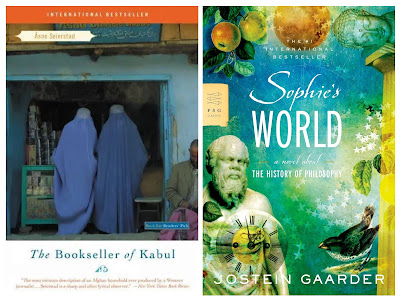It’s been a strange year for reading, and blogging, for me. My husband has been quite ill, and after a serious cycling accident in October, he has required much of my attention. Switching from WordPress to Blogger, as my domain at WordPress was full, was not as smooth as I had hoped. Nor did my relative lack of interaction with all of you help.
But, I have been reading, and fulfilling much of the blogging events I’d signed up for, nonetheless. Here is a list of the books I’ve read this year:
Books read in 2024
~January~
- Point Zero by Seicho Matsumoto (Japanese Literature Challenge 17)
- First Lie Wins by Ashley Elston
- The Forbidden Notebook by Alba De Cespedes (reread)
- Don’t Let Her Go by Willow Rose
- The Final Curtain by Keigo Higashino (Japanese Literature Challenge 17)
- Nails and Eyes by Kaori Fujino (Japanese Literature Challenge 17)
- Life and Death in Shanghai by Nein Chung (book club)
- Nowhere Like Home by Sara Shepard
- A Well-Behaved Woman by Anne Therese Fowler (book club)
- The Godwulf Manuscript by Robert B. Parker (reread)
- God Save The Child by Robert B. Parker (reread)
- Mortal Stakes by Robert B. Parker (reread)
- Undiscovered by Gabriela Weiner (IBP longlist 2024)
- The House on Via Gemito by Domenico Starnone (IBP longlist 2024)
- Crooked Plow by Itamar Vieira Junior (IBP shortlist 2024)
- A Dictator Calls by Ismail Kadare (IBP longlist 2024)
~April~
- Not A River by Selva Almada (IBP shortlist 2024)
- The Silver Bone by Andrey Kurkov (IBP longlist 2024)
- The Details by Ia Genberg (IBP shortlist 2024)
- Lost On Me by Veronica Raimos (IBP longlist 2024)
- The Promised Land by Robert B. Parker
- The Judas Goat by Robert B. Parker
- Simpatia by Rodrigo Blanco Calderon (IBP longlist 2024)
- How Do You Live? by Genzaburo Yoshino, translated from the Japanese by Bruno Navasky (#1937 Club)
- Knife by Salmon Rushdie
- The Hunter by Tana French
- Looking For Rachel Wallace by Robert B. Parker
- Early Autumn by Robert B. Parker
- A Savage Place by Robert B. Parker
- Ceremony by Robert B. Parker
- A House Like An Accordion by Audrey Burges
- Luncheon of the Boating Party by Susan Vreeland (Paris in July 2024)
- Sipsworth by Simon Van Booy
- Long Island by Colm Toibin
- Madame Bovary by Gustave Flaubert (Paris in July 2024)
- Lady Tan’s Circle of Women by Lisa See (book club)
- Down and Out in Paris and London by George Orwell (Paris in July, Reading Orwell 2024)
- Tsar by Ted Bell
- The Deep Blue Good-by by John D. MacDonald
- Lonesome Dove by Larry McMurtry (Classic Club Spin #38/Pulitzer Prize winner)
- The Empusium by Olga Tokarczuk (Women in Translation Month)
- The Other Woman by Therese Bohman (Women in Translation Month)
- Emily Forever by Maria Navarro Skaranger
- Nightmare in Pink by John MacDonald
- Kristan Lavransdattar: The Wreath by Sigrid Undset
- Cold Hearts by Gunnar Staaleson
- The Heaven and Earth Grocery Store by James McBride
- Speaks The Nightbird by Robert McCammon (R.I.P. XIX)
- The Other Name by Jon Fosse (Norway in November)
- Ti Amo by Hanne Orstavik (Norway in November)
- Professor Andersen’s Night by Dag Solstad (Norway in November)
- Death Deserved by Horst and Enger (Norway in November)
- The City and Its Uncertain Walls by Haruki Murakami
- The Full Moon Coffee Shop by Mai Mochizuki
- The Therapist by B. A. Paris
Top Ten for 2024
- The Forbidden Notebook by Alba De Cespedes (although a reread, it stands the test of time)
- Nails and Eyes by Kaori Fujino (the imagery still lingers)
- Not A River by Selva Almada (for a mother’s love)
- Sipsworth by Simon Van Booy (because friends are found in unlikely places)
- Madame Bovary by Gustave Flaubert (every reread provides fresh insight)
- The Wreath by Sigrid Undset (it further launched my passion for classics, and Norwegian lit)
- The Other Name by Jon Fosse (a true favorite, again offering fresh insight each reread)
- Ti Amo by Hanne Orstavik (I’m always interested in stories of couples)
- Professor Andersen’s Night by Dag Solstad (offered a perspective on society)
- The City and Its Uncertain Walls by Haruki Murakami (because who doesn’t love reading about cats, and libraries, and loneliness, along with a parallel universe?)










































